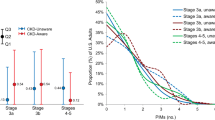Abstract
Older adults with chronic kidney disease (CKD) often receive treatment with multiple medications and are vulnerable to adverse treatment-related outcomes. Although specific guidelines for deprescribing (defined as the process of eliminating or reducing the use of unnecessary and/or inappropriate medications) in older patients with CKD are lacking, a systemic process should be used to assess the individual patient, identify the use of potentially inappropriate medications (PIMs), and deprescribe such medications when possible. Dosage tapering is needed when some commonly used PIMs (e.g. proton pump inhibitors and oral antidiabetic drugs) are deprescribed, but not when others (e.g. statins) are discontinued. Patient involvement and a collaborative approach are important factors in the success of the deprescribing process.

Similar content being viewed by others
References
Triantafylidis LK, Hawley CE, Perry LP, et al. The role of deprescribing in older adults with chronic kidney disease. Drugs Aging. 2018;35(11):973–84.
Stevens PE, Levin A. Evaluation and management of chronic kidney disease: synopsis of the kidney disease: improving global outcomes 2012 clinical practice guideline. Ann Intern Med. 2013;158(11):825–30.
Chiu YW, Teitelbaum I, Misra M, et al. Pill burden, adherence, hyperphosphatemia, and quality of life in maintenance dialysis patients. Clin J Am Soc Nephrol. 2009;4(6):1089–96.
Blix HS, Viktil KK, Moger TA, et al. Use of renal risk drugs in hospitalized patients with impaired renal function: an underestimated problem? Nephrol Dial Transplant. 2006;21(11):3164–71.
Chang F, O’Hare AM, Miao Y, et al. Use of renally inappropriate medications in older veterans: a national study. J Am Geriatr Soc. 2015;63(11):2290–7.
Jones SA, Bhandari S. The prevalence of potentially inappropriate medication prescribing in elderly patients with chronic kidney disease. Postgrad Med J. 2013;1051(89):247–50.
American Geriatrics Society. Updated Beers Criteria for potentially inappropriate medication use in older adults. J Am Geriatr Soc. 2015;63(11):2227–46.
Hanlon JT, Aspinall SL, Semla TP, et al. Consensus guidelines for oral dosing of primarily renally cleared medications in older adults. J Am Geriatr Soc. 2009;57(2):335–40.
Gooch K, Culleton BF, Manns BJ, et al. NSAID use and progression of chronic kidney disease. Am J Med. 2007;120(3):280.
Plantinga L, Grubbs V, Sarkar U, et al. Nonsteroidal anti-inflammatory drug use among persons with chronic kidney disease in the United States. Ann Fam Med. 2011;9(5):423–30.
McIntyre C, McQuillan R, Bell C, et al. Targeted deprescribing in an outpatient hemodialysis unit: a quality improvement study to decrease polypharmacy. Am J Kid Dis. 2017;70(5):611–8.
Nochaiwong S, Ruengorn C, Awiphan R, et al. The association between proton pump inhibitor use and the risk of adverse kidney outcomes: a systematic review and meta-analysis. Nephrol Dial Transplant. 2018;33(2):331–42.
Reeve E, Andrews JM, Wiese MD, et al. Feasibility of a patient-centered deprescribing pross to reduce inappropriate use of proton pump inhibitors. Ann Pharmacother. 2015;49(1):28–38.
Improving care and promoting health in populations. standards of medical care in diabetes-2018. Diabetes Care. 2018;41(Suppl 1):S7–12.
Moreno G, Mangione CM, Kimbro L, et al. Guidelines abstracted from the American Geriatrics Society Guidelines for Improving the Care of Older Adults with Diabetes Mellitus: 2013 update. J Am Geriatr Soc. 2013;61(11):2020–6.
Moreno G, Mangione CM. Management of cardiovascular disease risk factors in older adults with type 2 diabetes mellitus: 2002-2012 literature review. J Am Geriatr Soc. 2013;61(11):2027–37.
Kirkman MS, Briscoe VJ, Clark N, et al. Diabetes in older adults: a consensus report. J Am Geriatr Soc. 2012;60(12):2342–56.
Farrell B, Black C, Thompson W, et al. Deprescribing antihyperglycemic agents in older persons: evidence-based clinical practice guideline. Can Fam Physician. 2017;63(11):832–43.
FDA Drug Safety Communication: FDA revises warnings regarding use of the diabetes medicine metformin in certain patients with reduced kidney function. 2016.
American Diabetes Association. Position statement 9: pharmacological approaches to glycemia treatment: Standards of Medical Care in Diabetes—2019. Diabetes Car. 2019;42(Suppl 1):S90–102.
American Diabetes Association. Position Statement 11: microvascular complications and foot care: Standards of Medical Care in Diabetes - 2019. Diabetes Car. 2019;42(Suppl 1):S124–38.
Wanner C, Krane V, Marz W, et al. Atorvastatin in patients with type 2 diabetes mellitus undergoing hemodialysis. N Engl J Med. 2005;353(3):238–48.
Fellstrom BC, Jardine AG, Schmieder RE, et al. Rosuvastatin and cardiovascular events in patients undergoing hemodialysis. N Engl J Med. 2009;360(14):1395–407.
Palmer SC, Craig JC, Navaneethan SD, et al. Benefits and harms of statin therapy for persons with chronic kidney disease: a systematic review and metaanalysis. Ann Intern Med. 2012;157(4):263–75.
Herrington WG, Emberson J, Mihaylova B, et al. Impact of renal function on the effects of LDL cholesterol lowering with statin-based regimens: a meta-analysis of individual participant data from 28 randomised trials. Lancet Diabetes Endocrinol. 2016;4(10):829–39.
Kurella Tamura M, Covinsky KE, Chertow GM, et al. Functional status of elderly adults before and after initiation of dialysis. N Engl J Med. 2009;361(16):1539–47.
Schlanger LE, Bailey JL, Sands JM. Geriatric nephrology: old or new subspecialty. Clin Geriatr Med. 2009;25(3):311–24.
Lee SJ, Kim CM. Individualizing prevention for older adults. J Am Geriatr Soc. 2018;66(2):229–34.
Lee SJ, Leipzig RM, Walter LC. Incorporating lag time to benefit into prevention decisions for older adults. JAMA. 2013;310(24):2609–10.
De Vriese AS. Should statins be banned from dialysis? J Am Soc Nephrol. 2017;28(6):1675–6.
Holmes HM, Todd A. Evidence-based deprescribing of statins in patients with advanced illness. JAMA Intern Med. 2015;175(5):701–2.
Kutner JS, Blatchford PJ, Taylor DH Jr, et al. Safety and benefit of discontinuing statin therapy in the setting of advanced, life-limiting illness: a randomized clinical trial. JAMA Intern Med. 2015;175(5):691–700.
Messow CM, Isles C. Meta-analysis of statins in chronic kidney disease: who benefits? QJM. 2017;110(8):493–500.
Author information
Authors and Affiliations
Corresponding author
Ethics declarations
Conflict of interest
The article was adapted from Drugs & Aging 2018;35(11):973–84 [1] by employees of Adis International Ltd/Springer Nature, who are responsible for the article content and declare no conflicts of interest.
Funding
The preparation of this review was not supported by any external funding.
Rights and permissions
About this article
Cite this article
Writers, A.M. Identify potentially inappropriate medications in older adults with chronic kidney disease and deprescribe when possible. Drugs Ther Perspect 35, 376–380 (2019). https://doi.org/10.1007/s40267-019-00639-3
Published:
Issue Date:
DOI: https://doi.org/10.1007/s40267-019-00639-3




